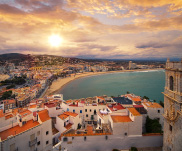What are the Requirements for P-1A Visas for Internationally Recognized Athletes?
In order be considered internationally recognized for P-1A visa purposes, an athlete or team must have reached a high level achievement in their sport and be coming to the U.S. to participate in distinguished athletic events. These P-1 visas for athletes and teams can be granted for up to one year for athletic teams and up to five years for individual athletes, both with the possibility of extension.
Support personnel essential to the athlete’s performance may apply to for a P-1S visa in order to accompany the team or athlete in the U.S. Common examples of support personnel include coaches, trainers, or referees. Support personnel must be performing services that cannot be performed by another individual in the U.S. Thus, the individual must be able to show evidence of his or her essentiality to the team or athlete, as well as evidence of their professional skills and experience, and his or prior work with the principal P-1A team or athlete.
What are the Requirements for P-1B Visas for Member of Internationally Recognized Entertainment Group?
In order be considered internationally recognized, the member(s) of the entertainment group must have reached a high level distinction in their field. The group must also be well-known as a whole, rather than as individual members. The entertainment group must have been established for a substantial period of time, generally at least one year. Also, 75 percent of the group members must have been part of the group for at least one year. P-1 visas for entertainers may be granted for up to one year with the possibility of extension.
Support personnel essential to the performance of the group can apply for a P-1S visa to accompany the group in the U.S. Common examples of support personnel include stagehands, band managers, and lighting and sound technicians. Support personnel must be performing services that cannot be performed by another individual in the U.S. Thus, the individual must be able to show evidence of his or her essentiality to the group, as well as evidence of their professional skills and experience, and prior work with the principal P-1 entertainment group.
What are the Requirements for P-2 Visas for an Individual or Part of a Group Entering to Perform Under a Reciprocal Exchange Program?
P-2 visas are for artists and entertainers who will, individually or as part of a group, perform under a reciprocal exchange program between an organization in the United States and an organization in another country. In addition to the P-2 artist entering the United States through a government recognized reciprocal exchange program, they must possess skills comparable to those of the United States artists and entertainers taking part in the reciprocal program outside the United States.
Support personnel essential to the performance of the group can apply for a P-1S visa to accompany the group in the U.S. Common examples of support personnel include stagehands, band managers, and lighting and sound technicians. Support personnel must be performing services that cannot be performed by another individual in the U.S. Thus, the individual must be able to show evidence of his or her essentiality to the group, as well as evidence of their professional skills and experience, and prior work with the principal P-2 visa holder.
What are the Requirements for P-3 Visas for Artists and Entertainers Performing a Culturally Unique Program?
The P-3 classification applies to those coming temporarily to perform, teach or coach as artists or entertainers, individually or as part of a group, under a program that is culturally unique.
Successful P-3 visa applicants must be coming to the United States for the purpose of developing, interpreting, representing, coaching, or teaching a unique or traditional ethnic, folk, cultural, musical, theatrical, or artistic performance or presentation. They must also be coming to the United States to participate in a cultural event or events which will further the understanding or development of their art form. The program may be of a commercial or noncommercial nature.
Essential support personnel who are an integral part of the performance of a P-3 artist or entertainer and who perform support services that cannot be readily performed by a U.S. worker, are also eligible for P-3 classification. Support personnel may include coaches, scouts, trainers and other team officials and referees.
If your questions were not addressed in the P visa FAQs page, please call one of our law offices or contact us today.



